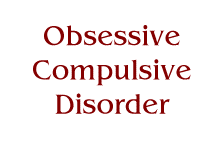
|
|
|
Obsessions are thoughts that a person cannot seem to ignore. Compulsions are certain acts or behaviors that a person feels compelled to perform.
Common obsessive, intrusive thoughts are: fear of contamination, fear of causing harm to another, fear of making a mistake, fear of behaving in a socially unacceptable manner. Common compulsive, ritualistic behaviors are: checking, counting/repeating, collecting/hoarding, cleaning/washing, arranging/organizing. Obsessive-compulsive disorder (OCD) is an anxiety disorder that is potentially disabling and can persist throughout a persons life. OCD affects more than 2 percent of the population. It is more common than such severe mental illnesses as schizophrenia and manic-depressive illness, and males and females are equally affected. OCD tends to last for years, even decades. |

|
|
|

Getting Control : Overcoming Your Obsessions and Compulsions
|
|
Contact: Ascend |
 Just Checking : Scenes from the Life of an Obsessive-Compulsive by Emily Colas. Colas presents a series of brief vignettes detailing the minutiae of living day-to-day with Obsessive-Compulsive Disorder (OCD), including candid, often hysterical ruminations on her colorful family members and friends, and her poignant relationship with her husband. |
